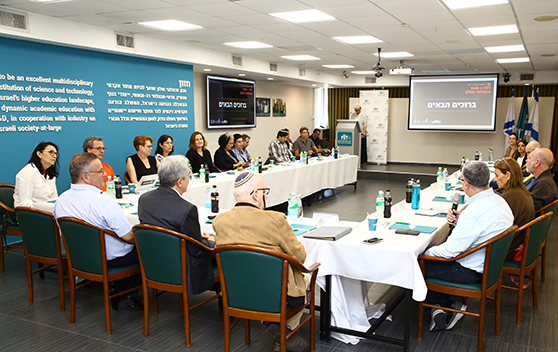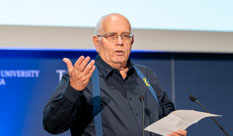More:
News & Stories
HIT hosts the “Leadership in Academia” delegation
Members of the “Leadership in Academia" Network founded by the Council for Higher Education Council (CHE), the Planning and Budget Committee (VATAT) and the Rothschild Foundation visited HIT- Holon Institute of Technology.

Members of ''Leadership in Academia'' . Photo by Ofer Amram
Fourteen members of the fourth class of the 'Leadership in Academia' program, which included leaders from the academic and administrative staffs of Tel Aviv, Hebrew, Haifa, Bar-Ilan, Ben Gurion and the Open Universities, and from Emek Izrael, Hadassah and the Academy of Music and Dance colleges, visited HIT.
The visit took place as part of the “Field Calls" initiative in order to take a close look at the changes taking place in the academic arena.
During the tour, which had been previously postponed due to the constraints of Corona and was held remotely by Zoom, diverse and thought-provoking projects taking place at HIT were explored.
"Welcome to HIT, we are proud to host the members of this distinguished network on the HIT campus, and we hope for many more relevant collaborations with the goal of fostering academic and administrative leadership, said Prof. Eduard Yakubov, President of HIT, as he opened the visit.
The “Leadership in Academia” program is aimed at creating a pool of potential leaders from within the Israeli academia, who will lead and influence Israeli higher education in the coming years.
Dr. Refael Barkan, HIT VP for Innovation, Entrepreneurship and Internationalization, and Prof. Hashem Zoubi, Senior Lecturer in the Department of Physics at the Faculty of Sciences, were chosen to represent HIT from a list of 33 representatives from all universities and 3 colleges in Israel. Representatives change in rotation between the institutions each year.
Prof. Zoubi and Dr. Barkan participated in the fourth cycle of the program.
Dr. Barkan spoke about the groundbreaking nature of the program. “I'm sure that everyone present here in the room knows how cooperation can leverage and improve the work of all of us in the academy.” He outlined the academic ecosystem in Digital Health, a major new academic initiative which has been developed in recent years at HIT. At its center - the unique and first study program in Israel for a bachelor's degree (B.Sc.) in Digital Medical Technologies.
As part of the program, students are exposed to a new world, which requires not only scientific-medical knowledge but also an advanced and innovative technological toolbox in medical content.
Graduates of the program are already being absorbed in the job market (hospitals, health insurance funds, pharmaceutical, medical insurance and start-up companies) or continue on to an MD program at one of Israel’s 4-year medical schools.
The guests visited several laboratories which focus on medical technologies and were updated by leading researchers about R&D projects carried out in these laboratories in cooperation with leading health agencies and organizations.
In addition, the delegation heard from Dr. Shai Gol, the head of HIT’s “Metzuyanoar” (Youth Excellence) program at HIT, which enrolls outstanding high school students from grades 9 to 12, who earn Advanced Placement credits toward their B.Sc. degree at HIT. He also spoke of the unique Mathematical Design Laboratory which he heads.
The visit ended with a lecture by Tali Malach Banaiim, founder and director of the FUTURE Entrepreneurship Center, which serves as a home for young entrepreneurs starting their journey.
"All of us here are leaders in academia, but not only! Remember that these are leaders ‘of change' in academia - a great initiative designed to bring us together so that we can join forces to formulate solutions to some of the prominent challenges in the world of academia today," concluded Prof. Zoubi.
- News & Events
New Collaboration with Sheba Medical Center will qualify nurses to work in a digital environment.
Collaboration between HIT Holon Institute of Technology, the teaching authority of the Sheba Medical Center, and the Sheba-BEYOND virtual hospital will allow training nurses in Israel and around the world to work in a digital...



 Additional programs
Additional programs
